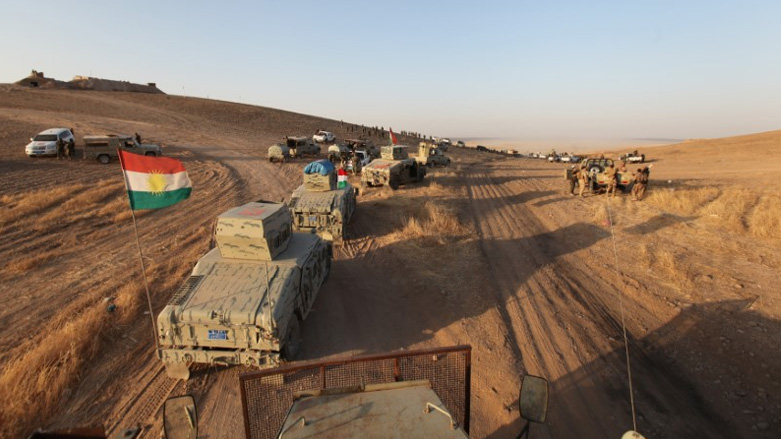Peshmerga, Iraqi military officials stress cooperation to combat ISIS

ERBIL (Kurdistan 24) – Senior military officials among both Kurdish Peshmerga and Iraqi forces highlighted the need to cooperate and coordinate efforts to combat the ongoing threats of terrorism in the country, and rejected reports of a deal to allow the redeployment of Peshmerga to disputed areas.
Both sides held a high-level meeting on Monday in Erbil, which was the first official meeting between Erbil and Baghdad following the Oct. 16 clashes in the disputed territories in 2017, Sarbast Lezgin, the deputy Minister of Peshmerga, told Kurdistan 24 on Wednesday.
He said the meeting was the first step to normalize relations and develop cooperation in areas where Islamic State sleeper cells take advantage of security vacuums.
Lezgin noted that two high-level and several low-level joint committees had been created to facilitate military and security coordination and cooperation between the two sides in the contact lines which stretch from Diyala to Nineveh province.
The US-led coalition had long encouraged both sides to hold meetings and coordinate their military efforts to combat the Islamic State, and now closely monitors the meetings taking place between both sides, according to the Kurdish official.
“Peshmerga forces are part of the Iraqi defense system. We have good coordination, and soon committees will convene to protect the entire territory of Iraq,” Chief of Staff of the Iraqi Defense Ministry, Osman al-Ghanmi, told Kurdistan 24 on Wednesday.

“We have finished a long road; a little bit left to establish more than a Joint Operation Command [between Peshmerga and Iraqi forces],” he said.
Kurdistan 24 learned that Peshmerga and Iraqi forces would hold another meeting soon, but this time in Baghdad to discuss further details about the security coordination.
Jabar Yawar, Secretary-General of the Peshmerga Ministry, stated that their coordination and cooperation would go through several stages. The first involves determining territories that require cooperation, then the military units between the two sides will be chosen.

In a separate statement on Wednesday, Yawar rejected reports claiming he said Erbil and Baghdad had agreed to allow the redeployment of the Peshmerga to the disputed territories.
The Iraqi Defense Ministry also denied the allegations, stating they only agreed to coordinate and cooperate in contact lines, without changing those lines or moving forces.
Standing next to the Kurdistan Region’s Interior Minister Karim Sinjari during a forum in Baghdad, Falih Fayyadh, the National Security Adviser of Iraq, told Kurdistan 24 that Iraq and Kurdistan share “good coordination” and “consult each other on security and military matters.”

Although Iraq declared victory against the Islamic State in December 2017, the extremist group continues to carry out insurgency attacks, ambushes, and kidnappings in the provinces of Kirkuk, Diyala, Salahuddin, and Nineveh.
Over the past year, senior Kurdish military officials in the Kurdistan Region have repeatedly warned the Federal Government of Iraq that the Islamic State is re-grouping in the aforementioned provinces.
Editing by Karzan Sulaivany
(Additional reporting by Blessa Shaweyis)
